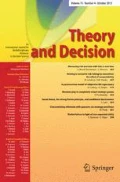Abstract
In his Truth and Probability (1926), Frank Ramsey provides foundations for measures of degrees of belief in propositions and preferences for worlds. Nonquantitative conditions on preferences for worlds, and gambles for worlds and certain near-worlds, are formulated which he says insure that a subject's preferences for worlds are represented by numbers, world values. Numbers, for his degrees of belief in propositions, probabilities, are then defined in terms of his world values. Ramsey does not also propose definitions of desirabilities for propositions, though he is in a position to do this. Given his measures for probabilities of propositions and values of worlds, he can frame natural definitions for both evidential and causal desirabilities that would measure respectively the welcomeness of propositions as items of news, and as facts. His theory is neutral with respect to the evidential/causal division. In the present paper, as Ramsey's foundations are explained, several problems and limitations are noted. Their distinctive virtue – their evidential/causal neutrality – is demonstrated. Comparisons are made with other foundational schemes, and a perspective is recommended from which nonquantitative foundations are not the be all for quantitative theories of ideal preferences and credences.
Similar content being viewed by others
REFERENCES
Broome, J. (1990), Bolker-Jeffrey Expected Utility Theory and Axiomatic Utilitarianism, Review of Economic Studies 57: 477–502.
Chellas, B. (1980), Modal Logic: An Introduction. Cambridge: Cambridge University Press.
Davidson, D. and Suppes, P. (1956), A Finitistic Axiomatization of Subjective Probability and Utility, Econometrica 24: 264–275.
Davidson, D. Suppes, P. and Siegel, S. (1957), Decision Making: An Experimental Approach. Stanford: University Press.
Debreu, G. (1959), Cardinal Utility for Even-chance Mixtures of Pairs of Sure Prospects, Review of Economic Studies 26: 174–177.
Domotor, Z. (1978), Axiomatization of Jeffrey Utilities, Synthese 39: 165–210.
Fishburn, P.C. (1970), Utility Theory for Decision Making. New York: John Wiley & Sons.
Fishburn, P.C. (1973), A Mixture-set Axiomatization of Conditional Subjective Expected Utility, Econometrica 41: 1–25.
Fishburn, P.C. (1974), On the Foundations of Decision Making under Uncertainty', in M.S. Balch et al. (eds.), Essays on Economic Behavior under Uncertainty, pp. 25–44. Amsterdam: North-Holland.
Fishburn, P.C. (1981), Subjective Expected Utility: A Review of Normative Theories, Theory and Decision 13: 139–199.
Gärdenfors, P. and Sahlin, N.-E., eds. (1988), Decision, Probability, and Utility. Cambridge: Cambridge University Press.
Gibbard, A. and Harper, W.L. (1978), Two kinds of Expected Utility, in Hooker et al. (eds.), Foundations and Applications of Decision Theory, pp. 125–162. Dordrecht: Reidel.
Jeffrey, R.C. (1990), The Logic of Decision, 2nd ed. paperback edition Chicago: University of Chicago Press. (“I have taken the opportunity afforded by a new printing to correct errata (where special thanks are due to Arthur Falk) and to clarify the discussion on p. 20 of the limits of ratificationism.” p. xiv.)
Jeffrey, R. (1992), New Foundations for Bayesian Decision Theory (pp. 213–225), Frameworks for Preference (pp. 226–231), in Probability and the Art of Judgment. Cambridge: University Press. (Reprinted respectively from Logic, Methodology, and Philosophy of Science, Y. Bar-Hillel (ed.), New York: Elsevier Science Publishers, 1965, and Essays on Economic Behavior under Uncertainty, M.S. Balch et al. (eds.), New York: Elsevier Science Publishers, 1974.)
Jeffrey, R. (1995), Decision Theory (pp. 179b–181b), and Ramsey (p. 672), in R. Audi (ed.), The Cambridge Dictionary of Philosophy. Cambridge: University Press.
Kaplan, M. (1986), Decision Theory as Philosophy. Cambridge: University Press.
Koons, R.C. (1993), Faith, Probability and Infinite Passion: Ramseyian Decision Theory and Kierkegaard's Account of Christian Faith, Faith and Philosophy 10: 145–160.
Krantz, D.H., Luce, R.D., Suppes, P. and Tversky, A. (1971), Foundations of Measurement. New York: Academic Press.
Lewis, D. (1973), Counterfactuals. Cambridge, Mass.: Harvard University Press.
Lewis, D. (1986), On the Plurality of Worlds. Oxford: Blackwell.
Pfanzagl, J. (1967), Subjective Probability Derived from the Morgenstern-von Neumann Utility Concept, in M. Shubik (ed.), Essays in Mathematical Economics, pp. 237–251. Princeton: University Press.
Pfanzagl, J. (1968), Theory of Measurement. New York: John Wiley & Sons.
Ramsey, F.P. (1988), Truth and Probability, in Gärdenfors and Sahlin (1988), pp. 19–47. (Reprinted from The Foundations of Mathematics, ed. R.B. Braithwaite (London: Routledge & Kegan Paul, 1931). Written in 1926.)
Ramsey, F.P. (1990), Probability and Partial Belief, in D.H. Mellor (ed.), Philosophical Papers, pp. 95–96. Cambridge: Cambridge University Press.
Savage, L.J. (1972), The Foundations of Statistics, 2nd revised edition. New York: Dover.
Sobel, J.H. (1994), Taking Chances: Essays on Rational Choice. Cambridge: University Press —'Utility Theory and the Bayesian Paradigm', pp 3–28; —'Notes on Decision Theory: Old Wine in New Bottles', pp 141–173; —'Partition Theorems for Causal Decision Theory', pp 174–196. (Respectively reprinted with revisions from: Theory and Decision 26, 1989; Australasian Journal of Philosophy 64, 1986; and Philosophy of Science 56, 1989, which, however, does not include the demonstration referenced in Section 9 above.)
Sobel, J.H. (1996), Pascalian Wagers, Synthese 108: 311–344.
Sobel, J.H. (1997), Cyclical Preferences and World Bayesianisms, Philosophy of Science 64: 42–73.
Stalnaker, R. (1968), A Theory of Conditionals, in N. Rescher (ed.), Studies in Logical Theory. Oxford: Blackwell.
Stalnaker, R. (1981), Letter to David Lewis: May 21, 1972, in W.L. Harper et al. (eds.), Ifs; Conditionals, Belief, Decision, Chance, and Time, pp. 151–152. Dordrecht: Reidel.
Rights and permissions
About this article
Cite this article
Howard Sobel, J. Ramsey's Foundations Extended to Desirabilities. Theory and Decision 44, 231–278 (1998). https://doi.org/10.1023/A:1004931018999
Issue Date:
DOI: https://doi.org/10.1023/A:1004931018999



